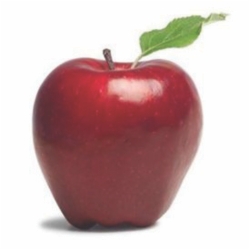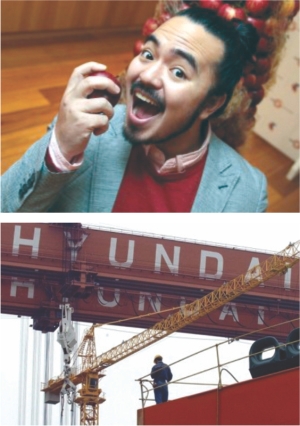| Home - Back Issues - The Team - Contact Us |
 |
| Volume 10 |Issue 36 | September 23, 2011 | |
|
|
Food for Thought Exploring Beyond Stereotypes Part II Farah Ghuznavi
Winchester's experience, described in his book, further contextualised this issue. He discussed the experience of visiting the Hyundai shipyard at Ulsan, which had made revolutionary strides in building and fitting out ships in the late 20th century, in a much shorter time and at a much lower cost than the European shipyards. Hardly surprising, when the shipyard at Ulsan provided employment for around 18,000 men working a six-day week. And measures were underway to ensure that those men worked hard! Their day began at 6:30 AM with half an hour of compulsory jogging - presumably intended to thoroughly wake up any slackers - after which they reported for work at the shipyard for a shift that began at 7:30 AM and continued through to 5:30 PM - with just a half hour lunch break, and two brief 10 minute breaks to interrupt the monotony of the day. Of course, they received a number of fringe benefits. They slept in Hyundai dormitories, ate in the Hyundai canteen; and even wore shoes and clothes provided by Hyundai (including their underwear!) Reading all this, I was reminded of some kind of futuristic sci-fi world where people live like drones and have very little contact with the natural world. As it turned out, it seems this wasn't too far from the lives of some of the factory workers at that time. One of the supervisors informed Winchester that workers had the option of taking three days holiday each year (generous or what?!), but many of them preferred not to - possibly having developed a fear of operating in the outside world without the protection of their corporate masters. There are those who would argue that such stringent exploitation of labour was a key part of what allowed Korea's economic miracle to take place, transforming it from a relatively unknown backwater that had suffered a history of colonisation by its neighbours, into a 20th century economic power exporting electronics and consumer goods to every corner of an eagerly waiting globe. Like neighbouring Japan, it created mass employment in the process, but this did not come without unexpected social costs. Interestingly enough, a recent survey in Japan showed that the highest rate of divorce occurred in couples where the man had retired. To put it bluntly, the analysts suggested that after decades of having a husband that many women barely saw - due to the punishing hours and all-encompassing work culture that was part of the Japanese work environment - they simply couldn't stand having their husbands around so much after retirement, and vice versa. They had more free time to argue, and surprisingly often this led to divorces among couples in their 70s!
All this made me think that perhaps the Bangladeshi workers under discussion weren't so badly off after all. Their financial remuneration must have been only a fraction of what the Korean workers that Winchester described earned, but perhaps they had lives outside of work? Of course, if asked, some of them might well prefer to trade in that freedom to be part of the South Korean model; but then again, maybe not. Many workers interviewed in the early days of the garments industry described one benefit of factory work as allowing for a greater degree of personal independence and social freedom - particularly for women, who tend to experience significantly restricted mobility relative to men in Bangladesh. South Korea itself suffered a period of industrial unrest in the mid-80s resulting precisely from workers' dissatisfaction with their conditions. While the Hyundai corporate system provided employment, accommodation and a degree of brainwashing (workers were encouraged to live by the company motto of "Diligence. Co-operation. Self-reliance"), it can probably be argued that Korean factory workers were frequently treated like drones. It would therefore probably not be that peculiar if similarly dismissive attitudes were to be on display towards the labour hired for work in enterprises here. In fact, there is evidence to indicate Koreans may have more in common with Bangladeshis than either group is aware of – and not just in their treatment of workers. For one thing, they take themselves very seriously, and it shows in their bureaucracy. Someone clearly went to great lengths to classify South Korea's national treasures into three categories of Objects and Sites with Historical and Artistic Value. As you would expect, the first category includes National Treasures such as palaces, memorials, castles and tombs; the second category is of Treasured Things, such as relics like temple bells and vases from various dynasties; and the third category is of Historic Sites, including battlefields and ruins. This is then followed by a further five classifications, of which the final category includes one domestic animal. Yes, I did say “domestic animal”…This is the Chindo-Kar, a small fluffy dog, whose continued survival and genetic purity is taken so seriously that it has the title of Protected Natural Resource 235, and there are armed guards posted on exits from its island of origin, so that none can be smuggled out! Koreans also have a delicious and varied cuisine that they take understandable pride in. It is spicy enough to satisfy the most demanding Bengali palate, and is meat-focused but enriched by a variety of lightly cooked and pickled vegetables - including the ubiquitous kimchi (cabbage in red chilli sauce) which accompanies almost every meal. As for how seriously seafood is taken, much like our own shutki, Winchester's story of a clothing line he spotted in the village illustrates it perfectly. He mentions coming across “a clothesline… hung with perfectly normal clothes - until I looked a little more closely. Hanging from it were, according to my notes, 'Shirt, trousers (blue), shirt, fish, vest, underpants, two fish, skirt, trousers (brown), fish, octopus, vest, shirt, fish, vest, vest'"! Finally, if that particular traveller's account is to be believed, Korean drivers share some similarities with their Bangladeshi counterparts, and driving through the South Korean countryside risks not only the occasional dent in your vehicle and a close shave or two, but also a possible close encounter with a "rice rocket" as the three wheeled micro tractor driven by farmers is sometimes disrespectfully called. Of course, in comparison to the lethal roads Bangladesh, those hazards are likely to be relatively minor. And I certainly can't imagine having a similar experience in Bangladesh as Winchester did with the car hire company where he obtained his vehicle in South Korea. When he returned to the agency with smoke pouring forth from the steering column of his car, brandishing the hire agreement which stated that "…we shall operate this business on the principle of Kindness, and shall make our best Efforts to ensure Safety and Convenience to the Renter, with the Service Devoted to the Renter in the spirit of Trust and Sincerity", the mortified saleswoman tearfully offered - more than once - to pay for the whole thing herself! Hmm, somehow don't think that's likely to happen in Bangladesh anytime soon. In the end it's hard not to have a soft spot for the country that came up with the "Kiss Apple", a real apple the size of a pingpong ball that is natural, portable and packed full of goodness. Its name derives from the fact that it is designed to freshen breath and cleanse teeth naturally e.g. In the event of an unexpected opportunity for kissing suddenly materialising. Conveniently pocket sized, it provides the added benefit that young people can be persuaded to eat more fruit in the pursuit of romance! Though given the social engineering nature of the South Korean state and corporate culture, it does raise certain questions over whether the purpose behind its creation was to facilitate romance, or promote a backdoor health-and-nutrition strategy...
Copyright (R) thedailystar.net 2011 |
||
 R
R